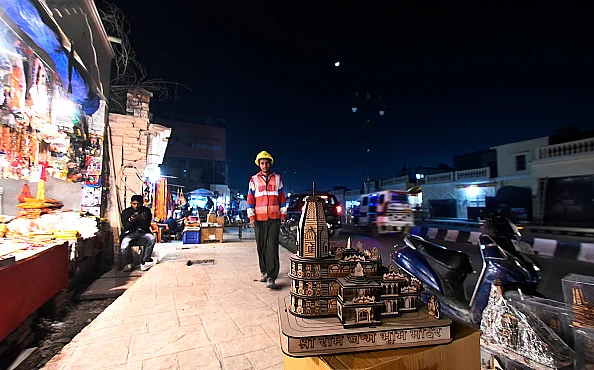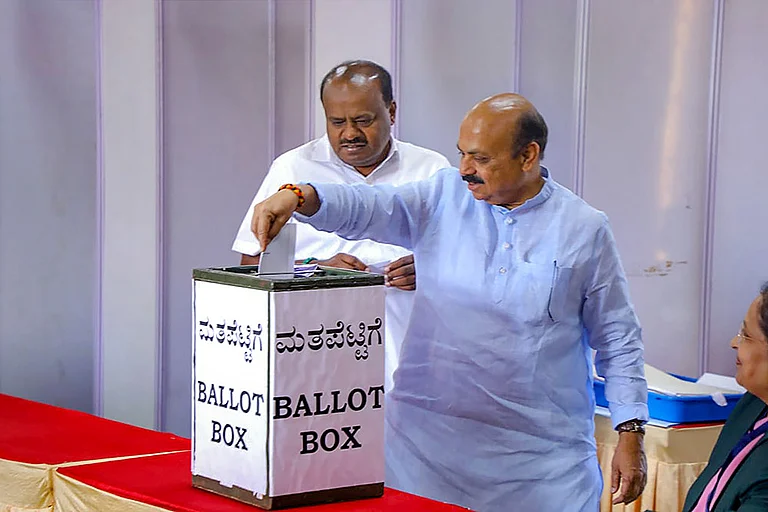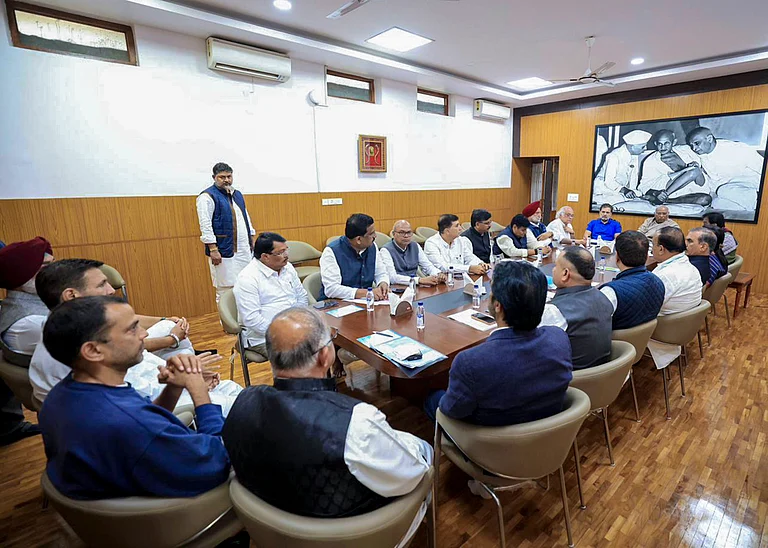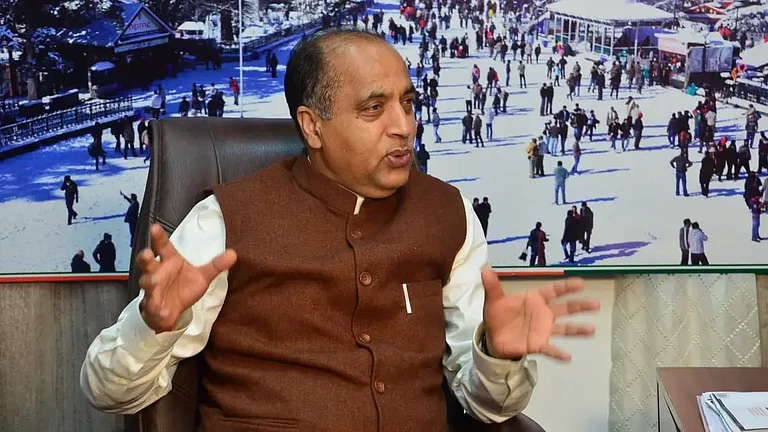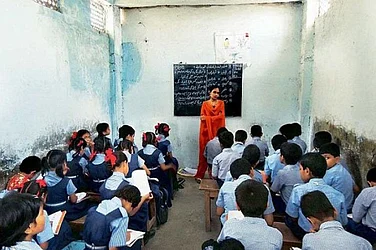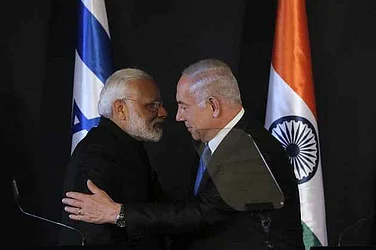“If Santa Claus and Christmas trees can be installed from December 25 to January 2, and you have no objection to that, then no one should have any objection to installing a replica of the Ram Mandir.”
These were the words of Pushyamitra Bhargava, Indore’s mayor, as he made it mandatory for all shopkeepers and mall administrations to install replicas of the Ayodhya temple from January 15 to January 22 – the day when the Ram Lalla idol will be installed in the sanctum sanctorum of Ram Mandir, in a ceremony called 'Pran Pratishtha'. He warned that anyone who fails to cooperate with the order, “people of Indore know how to respond to them”.
Amid an emphatic celebration for the Ram Temple inauguration led by the Bharatiya Janata Party and its ideological allies, several orders have been doing rounds in cities across India. Several BJP-ruled states including Uttar Pradesh, Rajasthan, Assam, Chhattisgarh and Uttarakhand have banned the sale of liquor and meat on January 22 to mark a ‘dry day’ on the auspicious event. However, the UP government went a step further to also declare a holiday for educational institutions on the day to celebrate what he called a “national festival”.
“Hindus also know that this is not just a religious event in that sense of the term. In one way it is because a temple is being inaugurated and the consecration of god is taking place. But people are aware that this event is, in fact, the announcement of Hindu supremacy over India. So it's two in one - religious and also an event to announce Hindu supremacy in India,” Apoorvanand, a professor at the University of Delhi, tells Outlook.
The Yogi Adityanath government had already prohibited the sale of liquor and meat in 84 Kos Parikrama Marg of the Ram Mandir, around the old city that used to be known as Faizabad until 2018. The order was contested by traders and shopkeepers whose livelihoods have been affected by it. But their say was overruled by that of the seers and sadhus who demanded to “preserve the sanctity of the place”.
In Chhattisgarh, Chief Minister Vishnu Dev Sai announced, "Ram Raj has been the model of our good governance.” In Maharashtra, while the government is yet to come up with any such order, BJP legislator Ram Kadam asked Chief Minister Eknath Shinde to impose a ban on alcohol and meat consumption.
In Goa, on the other hand, while the BJP government has declared a public holiday, it steered clear from announcing any prohibition on liquor or meat.
“The BJP has been acting in a clever way. It would be a meatless day in Uttar Pradesh, Madhya Pradesh, Gujarat or Rajasthan but not in Goa or Nagaland because the BJP knows that the people there won't accept it. So this is a kind of opportunistic Hinduism that we see being practiced. It has no principle,” says Apoorvanand.
Ram Rajya Or Hindu Rajya?
Volunteers of the Vishwa Hindu Parishad (VHP), a Hindu far-right organisation, have been going door-to-door in residential complexes across cities, most of them wearing saffron stoles, to hhand out invitation and akshate (whole grain rice in turmeric powder) to residents asking them to welcome Lord Ram into their homes. The ‘Akshate Invitation Maha campaign’ of the VHP might have aimed to celebrate the event but reports surfaced of some volunteers trying to enter the houses forcefully to “see the pooja room” and pressuring people to perform pooja rituals. Incidents like this have been reported particularly from Bengaluru.
"I am 63 years old and have never seen anything like this where any community insists on entering our homes… How can they insist on coming into our homes and seeing pooja rooms? Wherever the temple is being built isn't our concern,” a resident of Bengaluru told The News Minute.
The invitation card details rituals, endorsed by Sri Ram Janmabhoomi Tirthakshetra, and instructs people to mass chant 'Sri Rama Jayarama' 108 times and recite Hanuman Chalisa. The pamphlet also urges people to watch the live telecast, organise local programs and partake in devotional activities.
Meanwhile, in Indore, the mayor’s order to install Ram Mandir replicas has been widely accepted without any signs of dissent. Indore is a religious city known for its temples and religious festivities. Much like other cities in the Hindi heartland of Madhya Pradesh, Hinduism is the dominant religion in Indore. “People have accepted the order in the spirit of the messaging that we are going to celebrate this big event so you should also join,” says Professor Yatinder Singh Sisodia, Director at Madhya Pradesh Institute of Social Science Research, Ujjain. The basic idea, he says, is to maximise the popularity of this event.
Madhya Pradesh has a huge population of tribals and one would think they may be affected by these circulars. However, tribals are a minority population in the urban city of Indore and have not raised any objection to the VHP campaign. “The tribals are not anti-Ram temple or anti-Hindu sentiment. Just because they believe in nature-worshipping, does not mean they don’t believe in Valmiki. The idea of Valmiki is often propagated in Hindu ideologies because Valmiki was a tribal who wrote the Ramayana. So that is not going to be an issue at all in the city like Indore,” he notes.
But how far can one go with such mandatory orders? To this, Sisodia says, “We are living in the age of majoritarian politics. So, these are not very unusual decisions. These decisions echo with the majority of the people's sentiments. They (governments and district authorities) are not much concerned about whether or not the minority community is keen to observe it.”
Regarding to the VHP campaign, professor notes that in Madhya Pradesh, the response has been starkly different to that of Bengaluru. “Here, not only VHP volunteers are going house to house to distribute pamphlets but people have joined them to hand out invites in residential societies.”
“But Bangalore has a cosmopolitan culture where people may not be very willing to engage with the idea of celebration of Ram Mandir. People have different ideas of religion, of their belief, and of their celebrating any religious events,” he says.
Mahatma Gandhi, who was a known worshipper of Lord Ram, had said that “Ram Rajya” for him did not mean Hindu Raj but rather the kingdom of God. “For me, Rama and Rahim are one and the same deity. I acknowledge no other God but the one God of truth and righteousness.”
However, in celebrating the return of Lord Ram to Ayodhya, many BJP leaders have associated Ram Rajya with the rise of Hindu majoritarianism. Apoorvanand says, “Today, Hindu Rajya means a Rajya under the dictation of the Rashtriya Swayamsevak Sangh or the BJP. We must be clear about that. Hindu should be clear about that. The RSS will dictate how Hindus have to behave, how Hindus have to perform their puja.”






